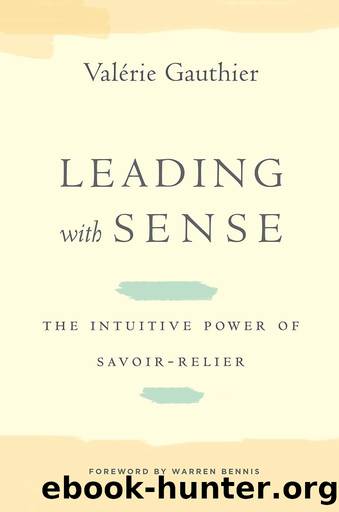Leading with Sense: The Intuitive Power of Savoir-Relier (Stanford Business Books) by Valérie Gauthier

Author:Valérie Gauthier [Gauthier, Valérie]
Language: eng
Format: epub
Publisher: Stanford University Press
Published: 2014-08-13T00:00:00+00:00
6
THE SAVOIR-RELIER PROTOCOL
How It Works in Practice
The evolution toward a savoir-relier organization implies the development of new skills, capacities, and mind-sets. The savoir-relier protocol facilitates the acquisition of these skills and mind-sets. Unlike traditional tools, which try to measure people by a score or type, the protocol is a process that is founded in introspection and quality human relations. Once again, we see the difference between sense makingâthe use of measurement tools to analyze existing conditions and draw conclusions based on the assumption, often flawed, that the same conditions will apply in the futureâand sense building, in which savoir-relier draws on current reality to project a vision of the future and acknowledges the potential for growth and change with certainty.
The protocol has been used for ten years; feedback from the hundreds of individuals who have participated makes frequent mention of feelings of confidence, trust, and well-being resulting from its use. Our research shows that it has a positive impact on peopleâs leadership.1 The process also has a positive viral dimension; we have found that executives who experience the savoir-relier protocol usually find it easier to apply in their team or business unit than other leadership concepts, such as quick wins or mentoring programs. Indeed, one of the advantages of the protocol is its flexibility: it can be applied at a pace that matches the availability and needs of the individual and the organization. While measurement-based systems tend to box people into set behaviors, the savoir-relier approach tends to free people and open new avenues for leadership.
HUMANS ARE TOO COMPLEX TO BE MEASURED
Standard Personality Tests Are Blunt Implements
Assessment tools have long invaded the way we think, live, and relate to one another. Because of our obsession with numbers and measurements, we often find that knowing the results of an assessment skews our perception and judgment of the person concerned. A wide range of methodologies is at our disposal to define individuals, from IQ tests of analytical and logical intelligence, to EQ tests of emotional intelligence, and even CQ tests for cultural intelligence. These standardized tests deliver scores or classifications that tell us where we are on a given scale and allow us to compare ourselves, or be compared, with other people. If your IQ score is 150 or above you will forever be classified as a genius; someone who scores around 100 points will be seen as normal and unexceptional. But what do those scores say about your genuine self, about how we change over time, and about our capacity to interact with others?
Some assessment tools, such as the Myers-Briggs Type Indicator and the Insight Inventory, try to measure and categorize personality. They rely on frames of reference, usually drawn from psychological theory. The Myers-Briggs relies on Carl Jungâs personality types theory, for example, while the Insight Inventory is based on the work of three theorists: Kurt Lewin, Gordon Allport, and Raymond Cattell. Companies running the assessments often advertise how quick and easy they are to take. Indeed, the assessments are generally done online, using self-administered multiple-choice questionnaires, and are self-scored.
Download
This site does not store any files on its server. We only index and link to content provided by other sites. Please contact the content providers to delete copyright contents if any and email us, we'll remove relevant links or contents immediately.
Zero to IPO: Over $1 Trillion of Actionable Advice from the World's Most Successful Entrepreneurs by Frederic Kerrest(4527)
Machine Learning at Scale with H2O by Gregory Keys | David Whiting(4295)
Never by Ken Follett(3937)
Harry Potter and the Goblet Of Fire by J.K. Rowling(3848)
Ogilvy on Advertising by David Ogilvy(3608)
Shadow of Night by Deborah Harkness(3361)
The Man Who Died Twice by Richard Osman(3072)
Book of Life by Deborah Harkness(2932)
The Tipping Point by Malcolm Gladwell(2914)
Will by Will Smith(2911)
0041152001443424520 .pdf by Unknown(2843)
Purple Hibiscus by Chimamanda Ngozi Adichie(2828)
My Brilliant Friend by Elena Ferrante(2824)
How Proust Can Change Your Life by Alain De Botton(2807)
How to Pay Zero Taxes, 2018 by Jeff A. Schnepper(2646)
Hooked: A Dark, Contemporary Romance (Never After Series) by Emily McIntire(2550)
Rationality by Steven Pinker(2352)
Can't Hurt Me: Master Your Mind and Defy the Odds - Clean Edition by David Goggins(2324)
Borders by unknow(2304)
